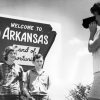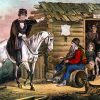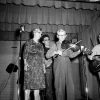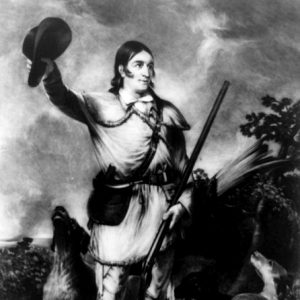calsfoundation@cals.org
Davy Crockett (1786–1836)
aka: David Crockett
The legendary frontiersman and congressman David (Davy) Crockett passed through Arkansas on his way from Tennessee to Texas in 1835. While at a Little Rock (Pulaski County) banquet given in his honor, he reportedly stated, “If I could rest anywhere it would be in Arkansas, where the men are of the real half-horse, half-alligator breed such as grow nowhere else on the face of the universal earth but just around the backbone of North America.”
Davy Crockett was born in Greene County, Tennessee, on August 17, 1786. His parents were John and Rebecca Hawkins Crockett. He ran away from home at about age thirteen and did not return home for some thirty months.
In 1806, Crockett married Mary “Polly” Finley, and they had three children, sons John Wesley and William and daughter Margaret. Polly Crockett died in 1815, and Crockett married Elizabeth Patton the following year. They had three children (Rebecca Elvira, Robert Patton, and Matilda), and Crockett supported his family primarily as a farmer and hunter.
Crockett enlisted as a volunteer in the Indian wars from 1813 to 1815 and saw action in Alabama and Florida.
In the fall of 1816, Crockett moved his family to what would become Lawrence County, Tennessee. He served as justice of the peace and commissioner for the town of Lawrenceburg and rose to the rank of lieutenant colonel-commandant in the local militia. In 1821, Crockett was elected to the Tennessee legislature, where he served two terms.
In 1827 Crockett was elected to the United States Congress from Tennessee, where he served from 1827 to 1831 and again from 1833 to 1835. Crockett’s tenure in Congress was most noted by his opposition to the president, fellow Tennessean Andrew Jackson, on land reform issues and the Indian removal bill.
Crockett split politically with Jackson on a number of issues, including the sale of vacant (un-owned) lands, which was a major concern of Crockett’s constituents in western Tennessee. With the growth of Crockett’s popularity, he was put forth by some members of the opposition Whig Party as a possible presidential candidate to oppose Martin Van Buren, Jackson’s hand-picked successor, in 1836.
It was during this time that the legend of Davy Crockett began to grow. Crockett promoted himself as a simple but honest man who was an outstanding hunter and marksman. In 1834, he published an autobiography, A Narrative of the Life of David Crockett of the State of Tennessee, which made him a popular figure nationally.
To derail Crockett’s political plans, Jackson and William Carroll, governor of Tennessee, engineered Crockett’s defeat in his bid for reelection to the Congress in 1835. Crockett was defeated by 252 votes.
Crockett hoped to revive his political career in Texas and left Tennessee for good in November 1835. Crockett and his party were well received during a stop in Little Rock. After leaving Little Rock, Crockett was toasted and celebrated for several days while in Washington (Hempstead County). He then continued the journey to Texas, with numerous unconfirmed exploits along the way adding to the Crockett legend.
Once in Texas, Crockett and his men joined Colonel William B. Travis in the fight for Texas independence. Crockett was killed by the Mexican army during the final day of the Battle of the Alamo on March 6, 1836, adding a final chapter to his colorful life.
One of Crockett’s grandsons, Robert Crockett, became the first mayor of Stuttgart (Arkansas County) after the town incorporated in 1889. The village of Crockett’s Bluff (Arkansas County) was named after William Finley Crockett, one of Davy Crockett’s sons.
For additional information:
Baugh, Virgil E. Rendezvous at the Alamo: Highlights in the Lives of Bowie, Crockett, and Travis. Lincoln: University of Nebraska Press, 1985.
Burrough, Bryan, Chris Tomlinson, and Jason Stanford. Forget the Alamo: The Rise and Fall of an American Myth. New York: Penguin Press, 2021.
Crockett, Davy. A Narrative of the Life of David Crockett of the State of Tennessee. Knoxville: University of Tennessee Press, 1973.
Davis, William C. Three Roads to the Alamo: The Lives and Fortunes of David Crockett, James Bowie, and William Barrett Travis. New York: HarperCollins Publishers, 1998.
Lofaro, Michael A. “Davy Crockett.” Handbook of Texas. https://www.tshaonline.org/handbook/entries/crockett-david (accessed November 18, 2024).
Shackford, James Atkins. David Crockett: The Man and the Legend. Chapel Hill: University of North Carolina Press, 1956.
Wallis, Michael. David Crockett: The Lion of the West. New York: W. W. Norton, 2011.
Jeff Bailey
Arkansas State University









Comments
No comments on this entry yet.